合法预期论文:我国行政法合法预期保护原则之确立
论行政允诺及其合法预期保护
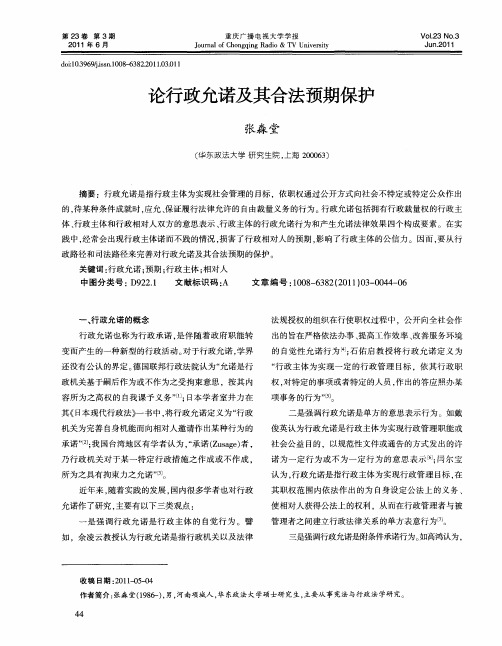
21 0 1年 6月
重 庆 广 播 电视 大 学 学 报
J un l fC o g igRa i o r a h n qn do& T nv ri o V U iest y
VO . 3 N0 3 1 . 2 J n2 1 u .0 1
d i0 9 %.s. 0 - 32 0 0 .1 o1. 6 i n 0 86 8 . 1. 0 : 3 s 1 2 13 1
利 主体 , 权要求前者兑现 。 有 如果行政 主体的履 诺不受 约束 , 相对人 的合 法利益将无法得到保障 。因此 , 允诺
行为不是一 种完全 自觉行为 ,而是具有 自我约束力 的 法律行 为 ,不能将 自己对相对人履行义务 当作是对相
向社会 不特定 或特定公众 作 出的待某种 条件成 就时 .
应允 、 保证履行法律允许 的 自由裁量义务 的行为 。
二、 行政允诺法律关 系的构成要素
1拥有行政 自由裁量权 的行政 主体 . 行政权 指一种行政 的资格或 能力 . 行政行 为是行 政权行使的外在表现方式 ,只有具备行政权 的组织或 个人 才能实施法律和作 出行政行为 ,也只有具备行政 权 的组织和个人所作 的行 为才有 可能是行 政行 为 . 不 具 备行 政权 的组 织 和个人 所作 的行 为 就不是 行政 行 为[ 。 1 基于行政主体意志 的参与程度 。 以将行政行为 可 划分 为羁束行政行 为和裁 量行政 行为。 所谓行政裁量 . 就是指在法律许可 的情况 下 。 对作 为或不作 为 , 以及 怎
一
是 强调 行政允 诺 是行政 主体 的 自觉行 为 。譬
如 ,余凌云教授认为行政允诺 是指行 政机关 以及法律
收 稿 日期 :0 10 4 2 1— 5
合法预期论文:我国行政法合法预期保护原则之确立

合法预期论文:我国行政法合法预期保护原那么之确立【中文摘要】对行政法根本原那么的研究能够起到深化行政法学研究和完善行政法制的重大作用,为适当约束行政机关的行政行为,保护行政管理相对人的合法利益,我国行政法中规定了信赖保护原那么,但由于该原那么范围较狭窄,在实际操作中受到诸多限制。
因此,西方一些国家行政法中存在的合法预期保护原那么为我们带来了更广阔的思路。
合法预期保护的概念源于德国法,此后,在欧盟、法国、英国、美国等国家的行政法中得以广泛应用。
本文拟在了解西方主要国家在合法预期保护制度的根底上,针对我国现状,提出确立我国行政法合法预期保护原那么的框架以及相应的保护机制和措施。
【英文摘要】To build a credible government, constrain the administrative organs , protect the legitimate interests of the private party in administration ,the administrative law formulated the principle of The faith protection .But in practice, the faith protection principles are not adapted to the circumstances, the executive authorities of the administrative process is necessarily restricted. Some Western countries have legitimate expectations in administrative law principle of protection brought us new ideas, the principles can promote the Administrative guidance , administrative pensation and other systems and theories of reconstruction andreflection, and the give us a new theory of the review and thinking to accelerate the establishment of the rule of law, and make the government of the state and citizens develop a good relationship between.This article is divided into three parts with the gradual in-depth analysis.The first part is about the protection of legitimate expectations. First discusses the protection of legitimate expectations principles in Germany, the European Union, the United Kingdom, and the United States, and second, focuses on the relationship between the legitimate expectations protection principles and The faith protection principles, that the introduction of the principle of legitimate expectations protection reasons, the conclusion is that the legitimate expectations as a standard operational stronger, because in trust protection principle, the focus of the protected object is the executive administrative counterpart behavior from the trust, which is a subjective standard, there are some difficulties identified. The legitimate expectations of civil servants from government agencies conduct and speech, the principle object of protection is the result of administrative action made by the executive authorities must be able to rise the legitimate expectations of ordinary people, which is expected to include both theadministrative organ in the future will make a specific administrative act, including procedures based on specific administrative act made. This is an objective standard. In addition, depend on theprotection of the theory is difficult to describe the protection of personal, it is one-sided to advocate the protection of personal interests, but the principle of protection of legitimate expectations claim the protection of personal interests, it also emphasizes the protection of public interests. And then, the article analysis of the position of legitimate expectations, expected to be caused by the acts of the executive authorities, including policies issued bythe executive authorities, to make administrative decisions, promises, and the formation of the practice and so on. Meanwhile, the content must be reasonable, the expected must be legal, the last of the part is about the protection of legitimate expectations, it is divided into three aspects, namely, procedural safeguards, physical protection, indemnity (pensation) pensation protection.The second part is a parative study about the principles of legitimate expectations, the article categorized and classified the situations of the Legitimate Expectations, and shows the way in Germany, in the European Union, and in France, pare with thecases in our practices, finally expatiate analysis and ideas. These three situations are, first, the Administrative organs changed the policy. Policy is part of civic life, The executive authorities and the relative people established a link between, when the policy in place, the executive should not be arbitrary unilateral change policy, it should be constrained in the program. Considering China is in the social transition, many industries are in planning system to the market system. The initial policy, due to a lack of executive experience, information channels are sluggish, so less to research and listen. With the rapid development of society, the system is not as useful as it was. Therefore, I think, on the one hand is to encourage the executive to take gradual approach to minimize mutations. On the other hand, when the policy changed, Should be protect the individuals. Second, the administrative authority does not fulfill their mitments or provide error information. However, the executive often provide a variety of informal proposals, such as oral reply, published and so on. This shows that the executive authorities in their daily work have to administrative guidance widespread, because there is no formal procedure, when administrative authority does not fulfill its mitments, it should made relative based on theexpected behavior , so, the mitment of the executive must act with the guidance and supervision of strict constraints. First, written information and mitment can lead tolegitimate expectations. Second, take appropriate measures to prevent the relative expected damage, and Administrative organ should not be liable for offer wrong information and mitment. Third, the executive authorities did not implement policies. China’s “Administrative Licensing Law〞 in the provisions of the administrative licensing conditions “other requirements prescribed by the petent authority,〞 it shows that our law gives great discretion to the executive. To protect the legitimate interests of the administrative counterpart, the executive authorities in the implementation of administrative management must balance stability and flexibility to grasp. Treatment in the case, I think that should do the following two points. First, in the case, the executive must be given to deviate from the policy justification. Second, in the case, the deviate from the policy of the executive authorities should apply determine whether the conduct was unfair or legal standards.The third part is the theory about the protection of legitimate principles, it base on the law. First discussed the principles of law, stability, the rule of law andadministrative discretion, administrative self-restraint, the rule of law and personal autonomy relationship. In the rule of law, administrative authorities and the legal relationship established administrative counterpart, the executive administrative management must be according to law, and law stability theory includes two aspects, first, the stability of the law itself. That must be specific and clear. Second, the law should be stability and reliability. The executive can not make arbitrary changes to the administrative acts, while the law must be strictly limited retroactive effect. Stability of the law aims to protect citizens from unforeseen changes in government behavior, not only serve the government administrative acts of administrative efficiency, but also serve the interests of citizens. Therefore, the stability of administrative action law principle with the proper basis is established between the state and citizens a clear and stable relationship. Stability from the principles of law focuses on the principle of legitimate expectations, which are objective standards. At last analysis that the principle of legality is not all the requirements of the rule of law, illegal conduct can also lead to the legitimate expectations. At the end of the article, I express the effectiveness of administrative actiontheory and the relationship between the legal protections of legitimate expectations. Because the public administration is powerful, soeven if the existence of defects can not determine, the Administrative Act is valid as well, if the permission has not been given formal revocation of state organs, the administrative action still valid. However, if the acts of the executive authorities have a significant and obvious mistakes that anyone can clearly identify, though the state organs does not declare, the administrative actions also may determine invalid as well.【关键词】合法预期行政裁量法治【英文关键词】【目录】我国行政法合法预期保护原那么之确立内容提要4-6引言6-8 一、合法预期保护原那么的根本内容8-21 (一) 合法预期保护原那么的产生8-11 (二) 合法预期保护原那么与信赖保护原那么的关系11-15 (三) 合法预期的构成15-18 (四) 对合法预期的保护18-21 二、合法预期保护原那么比拟研究21-33 (一) 行政机关改变政策21-25 (二) 行政机关不履行承诺或者提供错误信息25-29 (三) 行政机关在个案中偏离政策29-33 三、合法预期的法理分析33-40 (一) 法治和法的安定性原那么33-34 (二) 法治和行政裁量、行政自我约束34-36 (三) 法治和个人自治36-37 (四) XX行政行为引发的合法预期37-38 (五) 行政行为的效力与合法预期保护38-40 结论40-41 参考文献41-44 论文摘要44-47 Abstract 47-50 后记51。
相对人对行政行为的合法预期与信赖保护原则

} 法 的 行 为 . 护 自 的 合 法 权 益 , 而 产 生 对 政 府 { 适 保 从 的 信 任 危 机 。 此 以 往 , 将 导 致 行 政 秩 序 极 大 的 不 稳 长 必
定 , 主法 治不 能实 现 , 会 和谐难 以构 建 一 民 社 从 监 督 行 政 主 体 依 法 行 政 和 合 理 行 政 、保 护 相 对 人合 法权 益 、 护 法 律权 威性 和社 会稳 定 性 … 发 3 . 维
政 仃 勾的 . 对 于 由此 给 相 对 方 造 成 的 损 失 麻 当 予 以 补
二 、 对 人 对 行 政 行 为 的 合 法 预 期 相
相 对 人 对 行 政 行 为 的 合 法 预 期 . 足 指 相 对 人 基 于 行 政 法 律 规 范 的 规 定 及 行 政 主 体 先 前 同 类 行 为 的 判 断 .对 相 天 行 政 主 体 可 能 作 的 行 政 行 为 的 预 测 与 期 待= 相 对 人 的 合 法 预 期 本 是 相 对 人 的 主 观 评 价 一 一 般
f 行 政 法 上 的 信 赖 保 护 原 则 是 指 就 行 政 相 对 人 统 法 律 法 规 的 规 定 和 行 政 管 理 的 先 例 正 确 估 价 自 己 在 行 政 法 律 关 系 巾 的 地 位 和 自 己 行 为 的 效 果 , 无 法 及 时 作
¨仃 政 主体 作 … 的 已生 效 的 行政 行 为信 赖 的保 护 , 相
信 赖保 护 对 此 类预 期 进 行 保 护 的原 则及 具 体 适 用。
关 键 词 :信赖保护 原则;行政行 为;合法预期 ;适用条件 ;保护原则 中图分类号 :D 2. 9 2J 文献标识码 :A 文章编号 :10 - 2 7( 06 4 0 7 - 3 0 7 8 0 2 0 )0 - 0 2 0
行政法中的合法预期保护原则分析

行政法中的合法预期保护原则分析作者:沈鸿伟来源:《法制与社会》2020年第12期关键词行政管理合法预期保护作者简介:沈鸿伟,江西师范大学政法学院。
中图分类号:D922.1 ; ; ; ; ; ; ; ; ; ; ; ; ; ; ; ; ; ; ; ; ; ; ; ; ; ; ; ;文獻标识码:A ; ; ; ; ; ; ; ; ; ; ; ;DOI:10.19387/ki.1009-0592.2020.04.241(一)合法预期保护的产生德国是较早提出合法预期发展原则的国家,这一原则源自于德国的宪法。
在对行政机关决定的撤销和行政变更的限制时,便可从宪法出发来对个人的合法预期进行考虑。
从法律本身而言,其在制定中需以稳定性为基础的,而实施中却往往存在着一定的滞后性,这对于一个法治国家而言是一个必须面对的问题[1]。
在这种情境下法治又要求法律可以在一定程度上因时而变,以灵活立法的形式维护法律的稳定性。
不少学者针对这一灵活性提出了自己的观点,认为这种灵活性需加以必要的限制。
于是,在信赖保护的支持下公民可将因行政制度变革而带来的损失降到最小或得到应有的补偿。
合法预期的原则已被多数国家所引入,并随之建立了一些保障的原则。
(二)合法预期保护的构成要件合法预期从法学领域而言,是指行政管理的相对人对于未来所获得利益的一种期望。
法学上的预期需以基础的行为为秩序,在努力确定他们的预期得到实现为前提。
若行政相对人想获得合法的预期保护必须具备以下三个方面的构成要件。
即必须是由有权作出意识表示的行政机关所引发;行政相对人的预期内容必须合法;行政相对人的合法预期利益和心理利益受到侵害。
首先,就由有权作出意识表示的行政机关所引发而言,这种情境中所产生的行为应当具有终局性或是已经成立的。
在实际发生时,行政机关所公布的政策或行政的决定、合同。
这些行政行为中不包括尚为正式发布或正式作出的政策和决定。
同时对于行政行为有权作出解释可视为法律当中对行政行为作出过明文的规定或行政人员在自己的权责范围内而作出的行政行为[2]。
论行政法中的合法预期保护原则
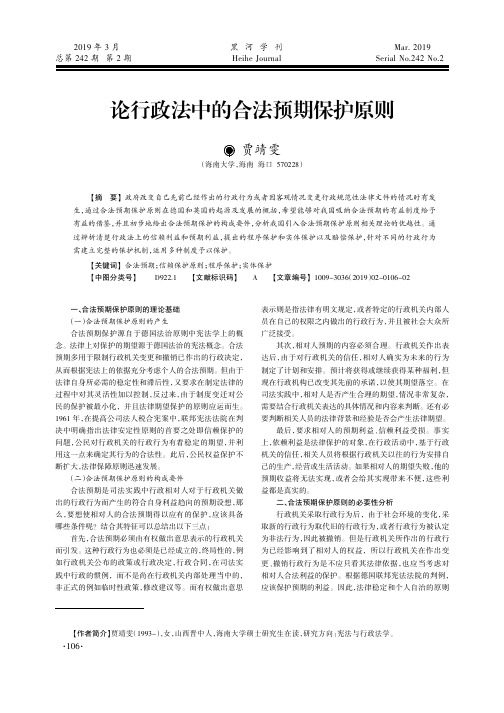
论行政法中的合法预期保护原则贾靖雯(海南大学,海南海口570228)【作者简介】贾靖雯(1993-),女,山西晋中人,海南大学硕士研究生在读,研究方向:宪法与行政法学。
【摘要】政府改变自己先前已经作出的行政行为或者因客观情况变更行政规范性法律文件的情况时有发生,通过合法预期保护原则在德国和英国的起源及发展的概括,希望能够对我国吸纳合法预期的有益制度给予有益的借鉴,并且初步地给出合法预期保护的构成要件,分析我国引入合法预期保护原则相关理论的优越性。
通过辨析清楚行政法上的信赖利益和预期利益,提出的程序保护和实体保护以及赔偿保护,针对不同的行政行为需建立完整的保护机制,运用多种制度予以保护。
【关键词】合法预期;信赖保护原则;程序保护;实体保护【中图分类号】D922.1【文献标识码】A【文章编号】1009-3036(2019)02-0106-02一、合法预期保护原则的理论基础(一)合法预期保护原则的产生合法预期保护源自于德国法治原则中宪法学上的概念。
法律上对保护的期望源于德国法治的宪法概念。
合法预期多用于限制行政机关变更和撤销已作出的行政决定,从而根据宪法上的依据充分考虑个人的合法预期。
但由于法律自身所必需的稳定性和滞后性,又要求在制定法律的过程中对其灵活性加以控制,反过来,由于制度变迁对公民的保护被最小化,并且法律期望保护的原则应运而生。
1961年,在提高公司法人税合宪案中,联邦宪法法院在判决中明确指出法律安定性原则的首要之处即信赖保护的问题,公民对行政机关的行政行为有着稳定的期望,并利用这一点来确定其行为的合法性。
此后,公民权益保护不断扩大,法律保障原则迅速发展。
(二)合法预期保护原则的构成要件合法预期是司法实践中行政相对人对于行政机关做出的行政行为而产生的符合自身利益趋向的预期设想,那么,要想使相对人的合法预期得以应有的保护,应该具备哪些条件呢?结合其特征可以总结出以下三点:首先,合法预期必须由有权做出意思表示的行政机关而引发。
余凌云:行政法上合法预期之保护.doc
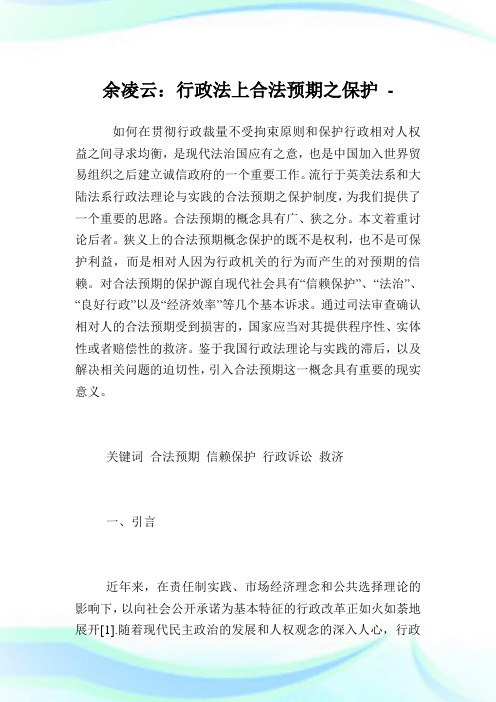
余凌云:行政法上合法预期之保护-如何在贯彻行政裁量不受拘束原则和保护行政相对人权益之间寻求均衡,是现代法治国应有之意,也是中国加入世界贸易组织之后建立诚信政府的一个重要工作。
流行于英美法系和大陆法系行政法理论与实践的合法预期之保护制度,为我们提供了一个重要的思路。
合法预期的概念具有广、狭之分。
本文着重讨论后者。
狭义上的合法预期概念保护的既不是权利,也不是可保护利益,而是相对人因为行政机关的行为而产生的对预期的信赖。
对合法预期的保护源自现代社会具有“信赖保护”、“法治”、“良好行政”以及“经济效率”等几个基本诉求。
通过司法审查确认相对人的合法预期受到损害的,国家应当对其提供程序性、实体性或者赔偿性的救济。
鉴于我国行政法理论与实践的滞后,以及解决相关问题的迫切性,引入合法预期这一概念具有重要的现实意义。
关键词合法预期信赖保护行政诉讼救济一、引言近年来,在责任制实践、市场经济理念和公共选择理论的影响下,以向社会公开承诺为基本特征的行政改革正如火如荼地展开[1].随着现代民主政治的发展和人权观念的深入人心,行政机关也越来越多地运用像劝导、诱导、咨询、建议这样的更加柔和的行政指导手段,让相对人能够更加自主地、有目的地并更有成效地安排自己未来的经济活动与生活。
所有这些革新,对于重塑国家和公民之间的关系,对于提高公共服务质量和推进民主政治无疑起到了巨大的、推波助澜的作用。
但与此同时,与之相伴随的责任机制问题却又始终困扰着公民、实践者和法院。
《中华人民共和国行政诉讼法》第12条第(二)项和《最高人民法院关于执行〈中华人民共和国行政诉讼法〉若干问题的解释》(以下简称《若干问题解释》)第3条规定:“行政机关针对不特定对象发布的能反复适用的行政规范性文件”,也就是“具有普遍约束力的决定、命令”,不属于行政诉讼范围。
而且,行政法理论也公认,行政法规范、尤其是低层次的行政规范性文件具有较大的不稳定性,这是行政法的基本特点之一。
政府信赖保护、正当期望和合法预期
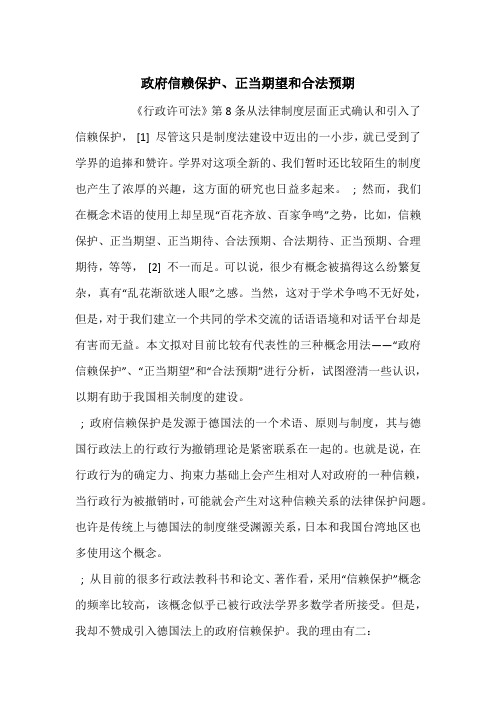
政府信赖保护、正当期望和合法预期《行政许可法》第8条从法律制度层面正式确认和引入了信赖保护,[1] 尽管这只是制度法建设中迈出的一小步,就已受到了学界的追捧和赞许。
学界对这项全新的、我们暂时还比较陌生的制度也产生了浓厚的兴趣,这方面的研究也日益多起来。
; 然而,我们在概念术语的使用上却呈现“百花齐放、百家争鸣”之势,比如,信赖保护、正当期望、正当期待、合法预期、合法期待、正当预期、合理期待,等等,[2] 不一而足。
可以说,很少有概念被搞得这么纷繁复杂,真有“乱花渐欲迷人眼”之感。
当然,这对于学术争鸣不无好处,但是,对于我们建立一个共同的学术交流的话语语境和对话平台却是有害而无益。
本文拟对目前比较有代表性的三种概念用法——“政府信赖保护”、“正当期望”和“合法预期”进行分析,试图澄清一些认识,以期有助于我国相关制度的建设。
; 政府信赖保护是发源于德国法的一个术语、原则与制度,其与德国行政法上的行政行为撤销理论是紧密联系在一起的。
也就是说,在行政行为的确定力、拘束力基础上会产生相对人对政府的一种信赖,当行政行为被撤销时,可能就会产生对这种信赖关系的法律保护问题。
也许是传统上与德国法的制度继受渊源关系,日本和我国台湾地区也多使用这个概念。
; 从目前的很多行政法教科书和论文、著作看,采用“信赖保护”概念的频率比较高,该概念似乎已被行政法学界多数学者所接受。
但是,我却不赞成引入德国法上的政府信赖保护。
我的理由有二:; 首先,与行政行为撤销理论联系在一起的信赖保护制度,对行政诉讼已有的权利保护来讲,没有多大的制度突破,而且保护范围嫌小。
; 我国《行政许可法》第8条实际上就是从这个层面上引入信赖保护的。
其实,在我看来,这不算是引进了我们所期待的、真正意义上合法预期制度,类似的问题实际上在我国的行政诉讼法中已经得到较为妥善的保护。
因为行政许可发放之后,基于行政行为的确定力和拘束力,相对人自然可以确信:只要其不违法,许可期限未届满,政府就不能随便撤销或者收回已颁发的许可。
行政法上合法预期之保护下
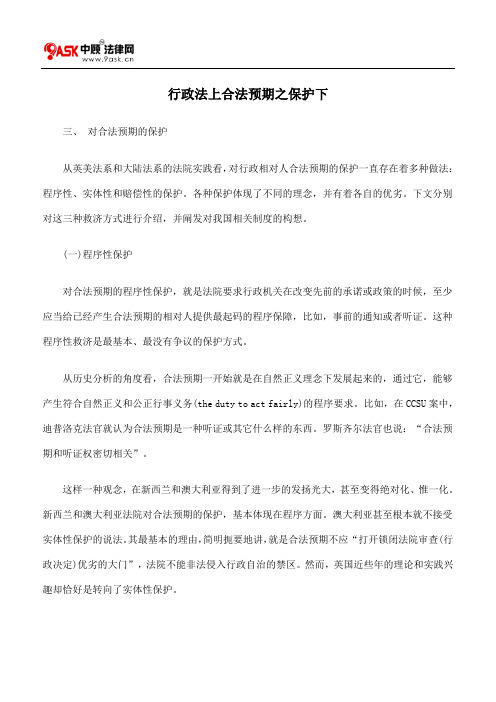
行政法上合法预期之保护下三、对合法预期的保护从英美法系和大陆法系的法院实践看,对行政相对人合法预期的保护一直存在着多种做法:程序性、实体性和赔偿性的保护。
各种保护体现了不同的理念,并有着各自的优劣。
下文分别对这三种救济方式进行介绍,并阐发对我国相关制度的构想。
(一)程序性保护对合法预期的程序性保护,就是法院要求行政机关在改变先前的承诺或政策的时候,至少应当给已经产生合法预期的相对人提供最起码的程序保障,比如,事前的通知或者听证。
这种程序性救济是最基本、最没有争议的保护方式。
从历史分析的角度看,合法预期一开始就是在自然正义理念下发展起来的,通过它,能够产生符合自然正义和公正行事义务(the duty to act fairly)的程序要求。
比如,在CCSU案中,迪普洛克法官就认为合法预期是一种听证或其它什么样的东西。
罗斯齐尔法官也说:“合法预期和听证权密切相关”。
这样一种观念,在新西兰和澳大利亚得到了进一步的发扬光大,甚至变得绝对化、惟一化。
新西兰和澳大利亚法院对合法预期的保护,基本体现在程序方面。
澳大利亚甚至根本就不接受实体性保护的说法。
其最基本的理由,简明扼要地讲,就是合法预期不应“打开锁闭法院审查(行政决定)优劣的大门”,法院不能非法侵入行政自治的禁区。
然而,英国近些年的理论和实践兴趣却恰好是转向了实体性保护。
但不管后来的发展路径在不同的国家中有着怎样的分歧,不可否认的是,合法预期作为发展自然正义的程序性理念的一个工具,大大地延展了自然正义和公正行事义务之程序保障的射程范围,使那些原本并没有这方面程序要求的行政机关行为也被赋予了程序保障的意义,以此来减轻行政机关行为对相对人可能产生的不利影响程度。
合法预期的保护之所以首先也最主要表现在程序方面,而且在普通法国家都普遍得到认同,在我看来,很可能是因为这比较符合普通法上对法官作用与角色的归属,即把法官的主要职责定位在判断行政决定是否公正之上。
行政机关尽管有权改变政策,但是,在这过程中有没有给可能受到影响的相对人一个听证的机会?有没有对具有合法预期的相对人予以特别的考虑?如果没有达到最起码的公正程序的要求,法院当然有权干预。
信赖保护和合理预期
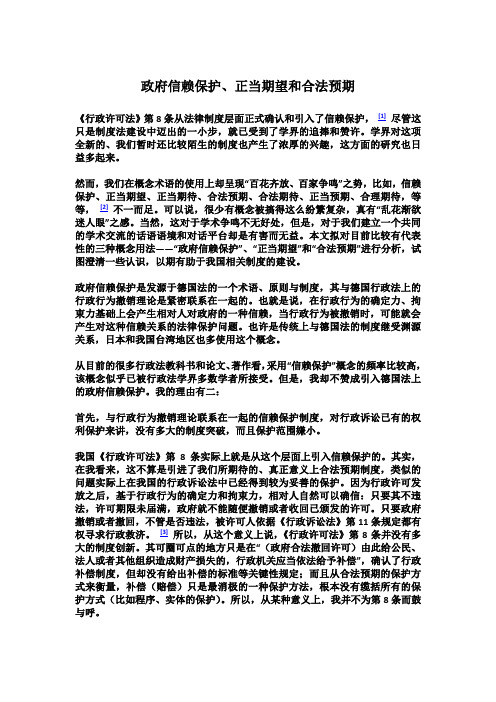
政府信赖保护、正当期望和合法预期《行政许可法》第8条从法律制度层面正式确认和引入了信赖保护,[1]尽管这只是制度法建设中迈出的一小步,就已受到了学界的追捧和赞许。
学界对这项全新的、我们暂时还比较陌生的制度也产生了浓厚的兴趣,这方面的研究也日益多起来。
然而,我们在概念术语的使用上却呈现“百花齐放、百家争鸣”之势,比如,信赖保护、正当期望、正当期待、合法预期、合法期待、正当预期、合理期待,等等,[2]不一而足。
可以说,很少有概念被搞得这么纷繁复杂,真有“乱花渐欲迷人眼”之感。
当然,这对于学术争鸣不无好处,但是,对于我们建立一个共同的学术交流的话语语境和对话平台却是有害而无益。
本文拟对目前比较有代表性的三种概念用法——“政府信赖保护”、“正当期望”和“合法预期”进行分析,试图澄清一些认识,以期有助于我国相关制度的建设。
政府信赖保护是发源于德国法的一个术语、原则与制度,其与德国行政法上的行政行为撤销理论是紧密联系在一起的。
也就是说,在行政行为的确定力、拘束力基础上会产生相对人对政府的一种信赖,当行政行为被撤销时,可能就会产生对这种信赖关系的法律保护问题。
也许是传统上与德国法的制度继受渊源关系,日本和我国台湾地区也多使用这个概念。
从目前的很多行政法教科书和论文、著作看,采用“信赖保护”概念的频率比较高,该概念似乎已被行政法学界多数学者所接受。
但是,我却不赞成引入德国法上的政府信赖保护。
我的理由有二:首先,与行政行为撤销理论联系在一起的信赖保护制度,对行政诉讼已有的权利保护来讲,没有多大的制度突破,而且保护范围嫌小。
我国《行政许可法》第8条实际上就是从这个层面上引入信赖保护的。
其实,在我看来,这不算是引进了我们所期待的、真正意义上合法预期制度,类似的问题实际上在我国的行政诉讼法中已经得到较为妥善的保护。
因为行政许可发放之后,基于行政行为的确定力和拘束力,相对人自然可以确信:只要其不违法,许可期限未届满,政府就不能随便撤销或者收回已颁发的许可。
法学中的合理预期原则分析
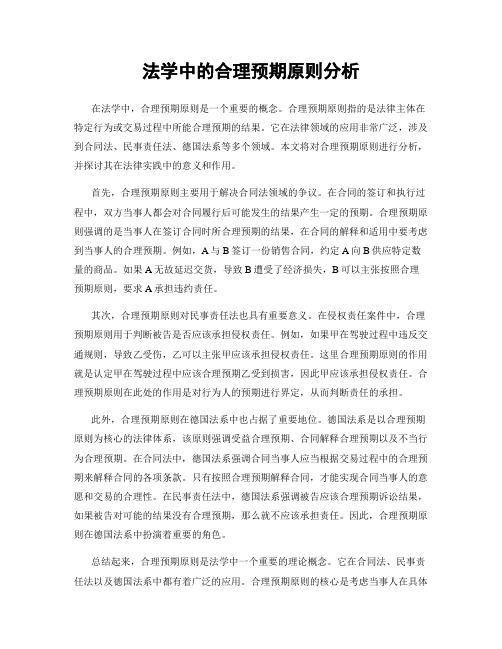
法学中的合理预期原则分析在法学中,合理预期原则是一个重要的概念。
合理预期原则指的是法律主体在特定行为或交易过程中所能合理预期的结果。
它在法律领域的应用非常广泛,涉及到合同法、民事责任法、德国法系等多个领域。
本文将对合理预期原则进行分析,并探讨其在法律实践中的意义和作用。
首先,合理预期原则主要用于解决合同法领域的争议。
在合同的签订和执行过程中,双方当事人都会对合同履行后可能发生的结果产生一定的预期。
合理预期原则强调的是当事人在签订合同时所合理预期的结果,在合同的解释和适用中要考虑到当事人的合理预期。
例如,A与B签订一份销售合同,约定A向B供应特定数量的商品。
如果A无故延迟交货,导致B遭受了经济损失,B可以主张按照合理预期原则,要求A承担违约责任。
其次,合理预期原则对民事责任法也具有重要意义。
在侵权责任案件中,合理预期原则用于判断被告是否应该承担侵权责任。
例如,如果甲在驾驶过程中违反交通规则,导致乙受伤,乙可以主张甲应该承担侵权责任。
这里合理预期原则的作用就是认定甲在驾驶过程中应该合理预期乙受到损害,因此甲应该承担侵权责任。
合理预期原则在此处的作用是对行为人的预期进行界定,从而判断责任的承担。
此外,合理预期原则在德国法系中也占据了重要地位。
德国法系是以合理预期原则为核心的法律体系,该原则强调受益合理预期、合同解释合理预期以及不当行为合理预期。
在合同法中,德国法系强调合同当事人应当根据交易过程中的合理预期来解释合同的各项条款。
只有按照合理预期解释合同,才能实现合同当事人的意愿和交易的合理性。
在民事责任法中,德国法系强调被告应该合理预期诉讼结果,如果被告对可能的结果没有合理预期,那么就不应该承担责任。
因此,合理预期原则在德国法系中扮演着重要的角色。
总结起来,合理预期原则是法学中一个重要的理论概念。
它在合同法、民事责任法以及德国法系中都有着广泛的应用。
合理预期原则的核心是考虑当事人在具体行为或交易过程中所能合理预期的结果。
合法行政原则论文

合法行政原则论文合法行政原则论文行政是指由国家行政机关对于不属于审判、检察工作以及立法中的其他法律的具体应用问题以及自己依法制定的法规进行的解释。
狭义地讲,指国家职能中,除了立法和司法以外的全部职能的总称;广义地讲,指作为决策职能的政治之外的执行职能。
下面我们来看一下相关论文吧。
[摘要]行政法的基本原则是行政法学的基本理论问题之一。
行政合法性原则是指行政权力存在、运用和行政必须依据法律、符合法律,而不得与法律相抵触。
这一原则是行政法的基本原则之一,而且是其首要原则。
本文主要从行政合法性原则的基本内容以及适用范围方面对行政行政合法性原则进行阐述。
[关键词]行政合法性原则;行政行为;依法行政行政法的基本原则,是指贯穿在一国行政法中,指导和统帅具体行政法律规范,并由它们所体现的基本精神,是要求所有行政主体在国家行政管理中必须遵循的基本行为准则。
一、行政合法性原则的基本内容行政合法性原则的基本内容的关键在于如何把握其核心内容。
既然行政法学的核心是解决行政职权的合法性问题,因此,也许从行政职权的产生、运作和监督的程度与角度来把握其基本内容更为合乎逻辑。
我们认为,行政合法性原则的基本内容主要有下列五项:第一,行政主体的行政职权由法设定与依法授予。
一切行政行为以行政职权为基础,无职权无行政。
然而,行政职权必须合法产生,行政主体的行政职权或由法律、法规设定,或由有关机关依法授予,不合法产生的行政职权不能构成合法行政的基础。
第二,行政主体实施行政行为必须依照和遵守行政法律规范。
这时含有“依法行政”和“守法行政”两项内容。
它要求每一个行政主体既要依法“管理”行政相对人,又应在其他行政主体的管理中遵守法律、法规和规章。
行政主体既是实施法律的主体,又是遵守法律的主体。
行政主体不得享有法律以外的特权。
第三,行政主体的行政行为违法无效。
行政主体的行政行为必须合法,它既应符合行政法律条文,更应符合法的精神。
违法的行政行为不具有法律效力,无论是实体上的违法,还是程序上的违法,因而它不能约束行政相对人的行为。
浅析合法预期原则

浅析合法预期原则
朱逸凡
【期刊名称】《争议解决》
【年(卷),期】2022(8)4
【摘要】合法预期原则起源于以英国为首的普通法国家。
经过英国一系列判决,从程序性保护发端到实体性保护迈进。
逐渐形成了以政府信任为基础,以实体性保护、程序性保护、补偿(赔偿)保护为救济手段的体系。
中国学界对合法预期原则抱有极大的热情,但是立法和司法中对于合法预期态度模糊,合法预期原则未能彻底走上正轨。
且目前很多能够由合法预期原则大展身手的领域,均被其他相关的制度取代,导
致合法预期原则在中国引入缺乏必要性。
【总页数】8页(P1109-1116)
【作者】朱逸凡
【作者单位】华东政法大学国际金融法律学院
【正文语种】中文
【中图分类】D92
【相关文献】
1.对合法预期保护原则之艰辛探索——以法律文本为对象的初步考察
2.卫生行政
许可中合法预期保护原则的适用初探3.欧盟法上合法预期原则的司法审查4.论欧
洲法院合法预期保护原则的适用5.论行政法中的合法预期保护原则
因版权原因,仅展示原文概要,查看原文内容请购买。
行政规范性文件变更中的合法预期

引
论
在我国行政实务中,行政机关可以通过变更 行政规范性文件的形式来进行行政管理,以实现 自己的管理目标或上级交付的各项任务。例如, 山西省政府制定颁布的《关于开展煤炭工业可持 续发展政策措施试点工作的总体实施方案》④以 及配套的具体实施措施等行政规范性文件,就是 为了“实现煤炭工业持续稳定健康发展,保障国 民经济发展需要”④这一行政管理目标而出台的。 然而,通阅该省相关文件,尤其是2008年9 月的《关于加快推进煤矿企业兼并重组的实施意 见》④和2009年4月的《关于进一步加快推进煤
第一,基于特定预期利益的内容或者范围已 经确定,此时合法预期获得了法律保护的客观可 能性,即虽然预期利益不一定能完全满足,但也不 应被粗暴地落空,至少相对人应有权利资格去主 张其实现(预期利益)。 第二,与法定权益的绝对保护性质不同,合法 预期能否受到法律保护,仍得取决于具体情形中 实体法条件和利益衡量结果。因此,从实质要素 来看,合法预期不是一种权利,因为“它能不能必 定得到法律的保护,特别是获得实现,都还是一个 未知数”@。 第三,然而合法预期也具备了一定的权利外 观形式,因为其不仅体现了要实现预期利益的意 愿,而且让外界感知为实现预期利益而付诸实践 的行为,例如,安排大额资金用于购买先进综采设 备并下井安装的信任行为,使处于合法预期地位 上的相对人具有为实现法律赋予的利益而请求国 家机关保护自己取得权益的权能。 由此观之,在该事件中,相关企业所产生的合 法预期就是确保预期利益取得实现,或使预期利 益要件的完成得以顺利进行,不受阻碍,或使其将 来取得的预期利益不至于丧失或减少其价值。拥 有合法预期的相关煤矿生产企业可以主张行政契 约继续有效履行而非中途被变更,或者请求行政 机关在行使变更裁量权时,必须进行无瑕疵裁量。
2010年第10期 利益,将继续享有且不被实质性地改变。”⑦相应 的,程序性合法预期和实体性合法预期也分别被 构建出来掣。 (二)合法预期的法律属性 1.合法预期是公民对国家的信赖与基本利益 诉求。、在该事件中,山西省地方政府与相关煤矿 生产企业签订行政契约,目的在于有效促成行政 机关所预期的特定行政目的的实现,因此相关煤 矿生产企业必须服从该行政机关的行为,才能使 自己同时获利。此时相关煤矿生产企业无疑会相 信依据行政契约所安排的“法律状态”将进入稳 定环境⑨。 2.合法预期是公民对行政法律秩序连续性的 一种经验反映。在该事件中,无论是制定法、产业 政策,还是地方实施细则或方案,均是根据一定经 验需求将权利(力)义务的一致性、连贯性引入了 法律过程中,为公民社会生活提供了较高程度的 有序性和稳定性。人们容易据此作出是继续投入 扩大煤炭生产还是没有任何作为的选择。这种经 验反映与人类本能的重复性需求相适应,体现的
我国行政法学展望论文(全文)
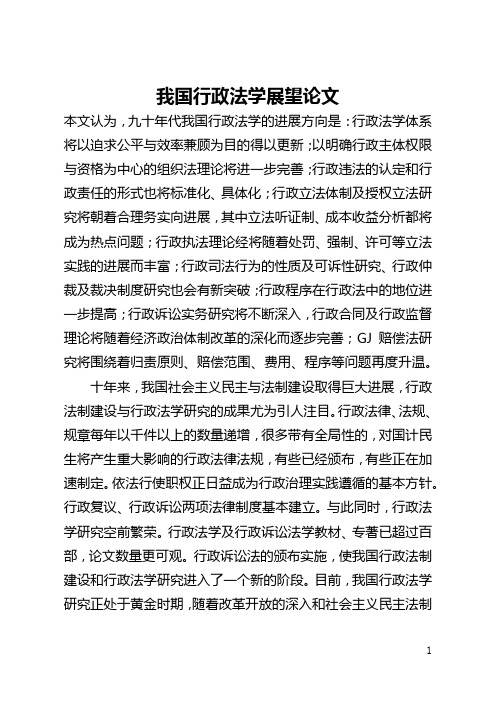
我国行政法学展望论文本文认为,九十年代我国行政法学的进展方向是:行政法学体系将以迫求公平与效率兼顾为目的得以更新;以明确行政主体权限与资格为中心的组织法理论将进一步完善;行政违法的认定和行政责任的形式也将标准化、具体化;行政立法体制及授权立法研究将朝着合理务实向进展,其中立法听证制、成本收益分析都将成为热点问题;行政执法理论经将随着处罚、强制、许可等立法实践的进展而丰富;行政司法行为的性质及可诉性研究、行政仲裁及裁决制度研究也会有新突破;行政程序在行政法中的地位进一步提高;行政诉讼实务研究将不断深入,行政合同及行政监督理论将随着经济政治体制改革的深化而逐步完善;GJ赔偿法研究将围绕着归责原则、赔偿范围、费用、程序等问题再度升温。
十年来,我国社会主义民主与法制建设取得巨大进展,行政法制建设与行政法学研究的成果尤为引人注目。
行政法律、法规、规章每年以千件以上的数量递增,很多带有全局性的,对国计民生将产生重大影响的行政法律法规,有些已经颁布,有些正在加速制定。
依法行使职权正日益成为行政治理实践遵循的基本方针。
行政复议、行政诉讼两项法律制度基本建立。
与此同时,行政法学研究空前繁荣。
行政法学及行政诉讼法学教材、专著已超过百部,论文数量更可观。
行政诉讼法的颁布实施,使我国行政法制建设和行政法学研究进入了一个新的阶段。
目前,我国行政法学研究正处于黄金时期,随着改革开放的深入和社会主义民主法制建设的推进,我国行政法学的研究必将迎来新的进展高峰。
回忆行政法学的十年进展,我们有一个深切的感受,即理论与实践的紧密结合始终是行政法学进展的源动力。
ZG行政法学研究肇始于十一届三中全会后这一新的历史时期,它的迅速进展与繁荣,与改革开放、民主法制建设的新形势同步。
行政实践为行政法学理论的不断完善提供了丰腴土壤。
几年来,广大行政法学理论工的双重职能等,都是值得深入研究的新课题。
(2)应确立哪些制度与原则,使行政机关设置更科学,运转更高效。
- 1、下载文档前请自行甄别文档内容的完整性,平台不提供额外的编辑、内容补充、找答案等附加服务。
- 2、"仅部分预览"的文档,不可在线预览部分如存在完整性等问题,可反馈申请退款(可完整预览的文档不适用该条件!)。
- 3、如文档侵犯您的权益,请联系客服反馈,我们会尽快为您处理(人工客服工作时间:9:00-18:30)。
合法预期论文:我国行政法合法预期保护原则之确立【中文摘要】对行政法基本原则的研究能够起到深化行政法学研究和完善行政法制的重大作用,为适当约束行政机关的行政行为,保护行政管理相对人的合法利益,我国行政法中规定了信赖保护原则,但由于该原则范围较狭窄,在实际操作中受到诸多限制。
因此,西方一些国家行政法中存在的合法预期保护原则为我们带来了更广阔的思路。
合法预期保护的概念源于德国法,此后,在欧盟、法国、英国、美国等国家的行政法中得以广泛应用。
本文拟在了解西方主要国家在合法预期保护制度的基础上,针对我国现状,提出确立我国行政法合法预期保护原则的框架以及相应的保护机制和措施。
【英文摘要】To build a credible government, constrain the administrative organs , protect the legitimate interests of the private party in administration ,the administrative law formulated the principle of The faith protection .But in practice, the faith protection principles are not adapted to the circumstances, the executive authorities of the administrative process is necessarily restricted. Some Western countries have legitimate expectations in administrative law principle of protection brought us new ideas, the principles can promote the Administrative guidance , administrative compensation and other systems and theories of reconstructionand reflection, and the give us a new theory of the review and thinking to accelerate the establishment of the rule of law, and make the government of the state and citizens develop a good relationship between.This article is divided into three parts with the gradual in-depth analysis.The first part is about the protection of legitimate expectations. First discusses the protection of legitimate expectations principles in Germany, the European Union, the United Kingdom, and the United States, and second, focuses on the relationship between the legitimate expectations protection principles and The faith protection principles, that the introduction of the principle of legitimate expectations protection reasons, the conclusion is that the legitimate expectations as a standard operational stronger, because in trust protection principle, the focus of the protected object is the executive administrative counterpart behavior from the trust, which is a subjective standard, there are some difficulties identified. The legitimate expectations of civil servants from government agencies conduct and speech, the principle object of protection is the result of administrative action made by the executive authorities must be able to rise the legitimate expectations of ordinary people, which is expected to include both theadministrative organ in the future will make a specific administrative act, including procedures based on specific administrative act made. This is an objective standard. In addition, depend on theprotection of the theory is difficult to describe the protection of personal, it is one-sided to advocate the protection of personal interests, but the principle of protection of legitimate expectations claim the protection of personal interests, it also emphasizes the protection of public interests. And then, the article analysis of the composition of legitimate expectations, expected to be caused by the acts of the executive authorities, including policies issued bythe executive authorities, to make administrative decisions, promises, and the formation of the practice and so on. Meanwhile, the content must be reasonable, the expected must be legal, the last of the part is about the protection of legitimate expectations, it is divided into three aspects, namely, procedural safeguards, physical protection, indemnity (compensation) compensation protection.The second part is a comparative study about the principles of legitimate expectations, the article categorized and classified the situations of the Legitimate Expectations, and shows the way in Germany, in the European Union, and in France, compare withthe cases in our practices, finally expatiate analysis and ideas. These three situations are, first, the Administrative organs changed the policy. Policy is part of civic life, The executive authorities and the relative people established a link between, when the policy in place, the executive should not be arbitrary unilateral change policy, it should be constrained in the program. Considering China is in the social transition, many industries are in planning system to the market system. The initial policy, due to a lack of executive experience, information channels are sluggish, so less to research and listen. With the rapid development of society, the system is not as useful as it was. Therefore, I think, on the one hand is to encourage the executive to take gradual approach to minimize mutations. On the other hand, when the policy changed, Should be protect the individuals. Second, the administrative authority does not fulfill their commitments or provide error information. However, the executive often provide a variety of informal proposals, such as oral reply, published and so on. This shows that the executive authorities in their daily work have to administrative guidance widespread, because there is no formal procedure, when administrative authority does not fulfill its commitments, it should maderelative based on the expected behavior , so, the commitment of the executive must act with the guidance and supervision of strict constraints. First, written information and commitment can lead tolegitimate expectations. Second, take appropriate measures to prevent the relative expected damage, and Administrative organ should not be liable for offer wrong information and commitment. Third, the executive authorities did not implement policies. China’s “Administrative Licensing Law” in the provisions of the administrative licensing conditions “other requirements prescribed by the competent authority,” it shows that our law gives great discretion to the executive. To protect the legitimate interests of the administrative counterpart, the executive authorities in the implementation of administrative management must balance stability and flexibility to grasp. Treatment in the case, I think that should do the following two points. First, in the case, the executive must be given to deviate from the policy justification. Second, in the case, the deviate from the policy of the executive authorities should apply determine whether the conduct was unfair or legal standards.The third part is the theory about the protection of legitimate principles, it base on the law. First discussed the principles of law, stability,the rule of law and administrative discretion, administrative self-restraint, the rule of law and personal autonomy relationship. In the rule of law, administrative authorities and the legal relationship established administrative counterpart, the executive administrative management must be according to law, and law stability theory includes two aspects, first, the stability of the law itself. That must be specific and clear. Second, the law should be stability and reliability. The executive can not make arbitrary changes to the administrative acts, while the law must be strictly limited retroactive effect. Stability of the law aims to protect citizens from unforeseen changes in government behavior, not only serve the government administrative acts of administrative efficiency, but also serve the interests of citizens. Therefore, the stability of administrative action law principle with the proper basis is established between the state and citizens a clear and stable relationship. Stability from the principles of law focuses on the principle of legitimate expectations, which are objective standards. At last analysis that the principle of legality is not all the requirements of the rule of law, illegal conduct can also lead to the legitimate expectations. At the end of the article, Iexpress the effectiveness of administrative action theory and the relationship between the legal protections of legitimate expectations. Because the public administration is powerful, soeven if the existence of defects can not determine, the Administrative Act is valid as well, if the permission has not been given formal revocation of state organs, the administrative action still valid. However, if the acts of the executive authorities have a significant and obvious mistakes that anyone can clearly identify, though the state organs does not declare, the administrative actions also may determine invalid as well.【关键词】合法预期行政裁量法治【英文关键词】【目录】我国行政法合法预期保护原则之确立内容提要4-6引言6-8一、合法预期保护原则的基本内容8-21(一) 合法预期保护原则的产生8-11(二) 合法预期保护原则与信赖保护原则的关系11-15(三) 合法预期的构成15-18(四) 对合法预期的保护18-21二、合法预期保护原则比较研究21-33(一) 行政机关改变政策21-25(二) 行政机关不履行承诺或者提供错误信息25-29(三) 行政机关在个案中偏离政策29-33三、合法预期的法理分析33-40(一) 法治和法的安定性原则33-34(二) 法治和行政裁量、行政自我约束34-36(三) 法治和个人自治36-37(四) 违法行政行为引发的合法预期37-38(五) 行政行为的效力与合法预期保护38-40结论40-41参考文献41-44论文摘要44-47Abstract47-50后记51。
